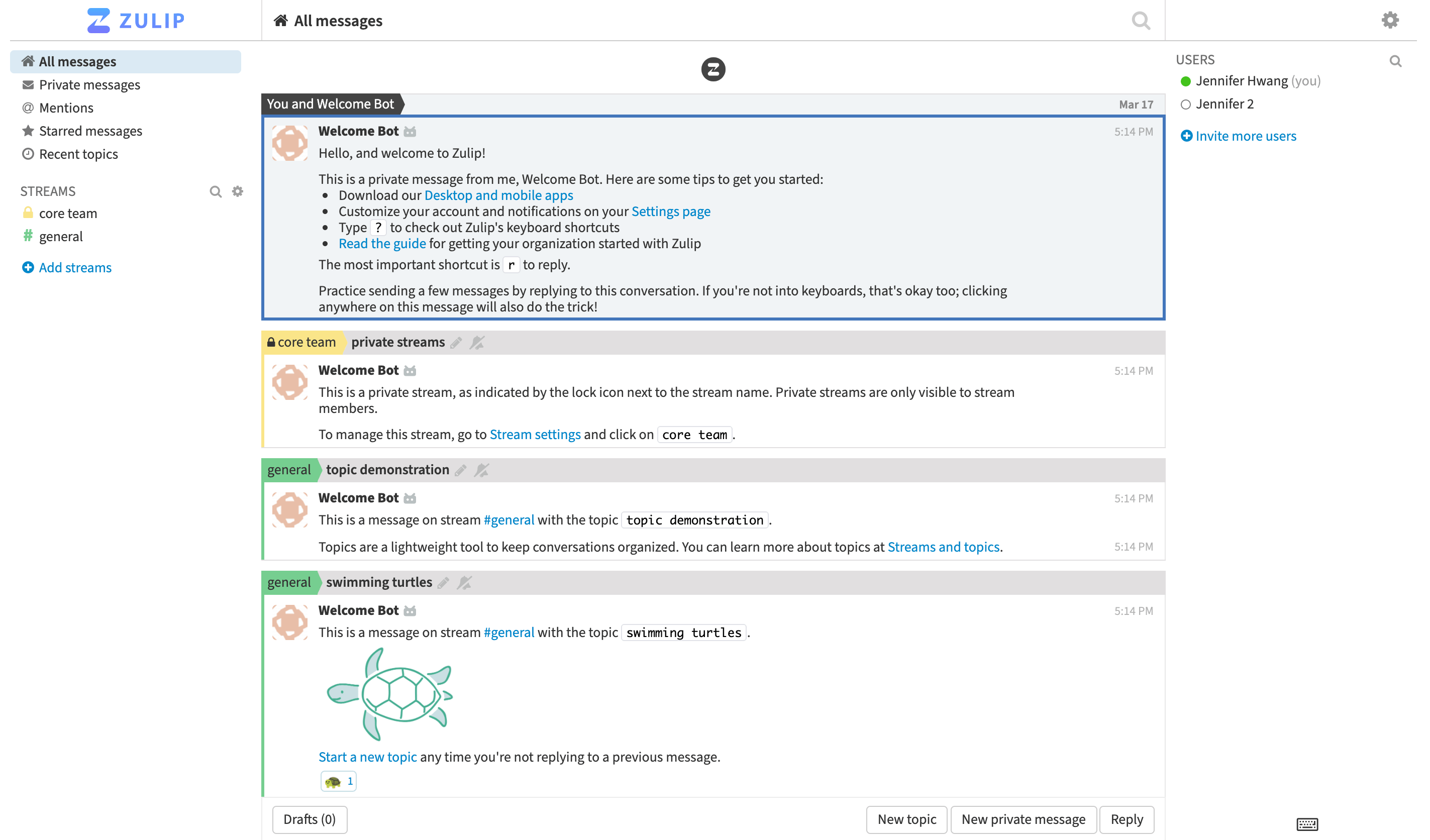Deploy Zulip
Zulip is an open source real-time chat application like Slack, but with an email-like threading model. The email threading model allows you to catch up on important conversations while ignoring irrelevant ones. Zulip's features include:
- Highly configurable notifications.
- Keyboard shortcuts.
- Mobile and desktop apps.
- Integrations with Trac, Nagios, GitHub, and more.
- Restful API with Python bindings.
- and more!

One-Click Deploy
Use the button below to deploy Zulip on Render.
It uses the github.com/render-examples/zulip repository to create the following components on Render:
- Zulip web/application server: contains Nginx, Django, Tornado, and Supervisor.
- Memcached instance: used to cache database model objects.
- Redis instance: used for short-term datastores.
- RabbitMQ instance: used as a queuing system and to communicate between Django and Tornado.
- PostgreSQL instance: used to store all persistent data.
More details on Zulip’s architecture here.
Zulip recommends deploying the main application/webserver with more than 2 GB RAM (ideally 4). The Standard instance type gives you 2 GB of RAM, but we recommend upgrading to the Pro instance type for production use. Zulip has documentation on how resource needs scale with the number of users on the app.
Environment Variables
You only need one environment variable to test your Zulip install:
| Key | Value |
|---|---|
SETTING_ZULIP_ADMINISTRATOR | email address of the Zulip administrator |
You will be able to set up your account and use all of Zulip's features as a single user. Inviting other users to join your realm (Zulip's term for organization) requires setting up email-related environment variables, which are explained below.
Setup
Once the zulip service is deployed and live, navigate to the Shell tab and type in:
Visit the link generated by the command and create your Zulip administrator account with the email you used for SETTING_ZULIP_ADMINISTRATOR.
Production
Zulip requires a mail server to send emails to users. Reliable mail delivery requires more work than just running the mail server, so we strongly recommend using a third-party email provider.
Zulip provides a list of recommended email providers you can use. We have tested this repo successfully with Mailgun, but other providers in the recommended list should work equally well.
These are the environment variables you will need to set for production use:
| Key | Value |
|---|---|
SETTING_EXTERNAL_HOST | hostname your users will use to connect to your Zulip server; leave empty to use onrender.com domain |
SETTING_EMAIL_HOST | address of your SMTP provider (ex. smtp.mailgun.org) |
SETTING_EMAIL_HOST_USER | your SMTP provider username (ex. postmaster@mg.example.com) |
SECRETS_email_password | your SMTP provider password |
SETTING_EMAIL_PORT | port your SMTP provider uses to connect (ex. 587) |
SETTING_EMAIL_USE_SSL | set to True if SETTING_EMAIL_PORT is using SSL; False otherwise |
SETTING_EMAIL_USE_TLS | set to True if SETTING_EMAIL_PORT is using TLS; False otherwise |
Third-party email providers support unencrypted and SSL/TLS-encrypted connections on multiple ports. SendGrid and Mailgun recommend the following settings:
| Key | Recommended Value |
|---|---|
SETTING_EMAIL_PORT | 587 |
SETTING_EMAIL_USE_SSL | False |
SETTING_EMAIL_USE_TLS | True |
Optional
Other environment variables you might change:
| Key | Default Values |
|---|---|
QUEUE_WORKERS_MULTIPROCESS | False sets Zulip to run in multithreaded mode, which is ideal for lower memory instances. Set to True if Zulip is run in a Pro instance or larger |
ZULIP_AUTH_BACKENDS | EmailAuthBackend supports email and password authentication, but Zulip also supports other authentication methods |